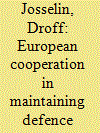| Srl | Item |
| 1 |
ID:
187360


|
|
|
|
|
| Summary/Abstract |
This paper examines the main determinants of French defense spending over the period 1958–2017. To estimate the determinants of defense spending, the demand defense literature considers both economic and strategic factors such as conflicts, threats, and alliances. Our approach is original because we focus on strategic factors, including proxies for an alliance’s membership and external threats. In addition, we include transnational terrorism as a proxy for internal threats. We find that defense spending is positively related to the gross domestic product, North Atlantic Treaty Organization membership, military operations abroad, and external threats and negatively linked to the population as a proxy to public service needs. These results are robust to changes in specifications and shifts in defense policy observed after 1991. This contribution underlines that the fundamental determinants of defense policy in France are economic conditions.
|
|
|
|
|
|
|
|
|
|
|
|
|
|
|
|
| 2 |
ID:
185354


|
|
|
|
|
| Summary/Abstract |
Based on economic geography concepts, this article proposes an original analytical framework to understand co-operation between countries in the Maintenance in Operational Condition (MOC) of defence equipment in Europe. European countries are facing problems of MOC cost growth under strong budgetary and usage constraints. A possible solution is to share costs to benefit from economies of scale. However, as the number of participating countries increases, the “distances” (geographical, normative, political) multiply and generate new costs. These costs are likely to weigh on the choices made by countries and therefore constitute a brake on pooling and sharing initiatives. This article proposes to understand the mutualisation of MOC in Europe through a set of centripetal forces (all the advantages offered by mutualisation) and centrifugal forces (all the costs generated by mutualisation). Such a reading grid makes it possible to consider the multidimensional trade-offs underlying the organisation of MOC in Europe.
|
|
|
|
|
|
|
|
|
|
|
|
|
|
|
|